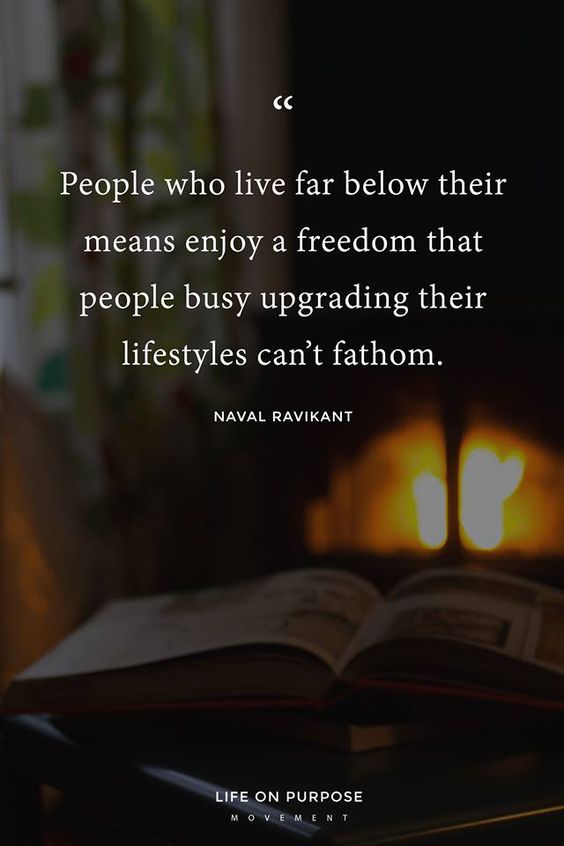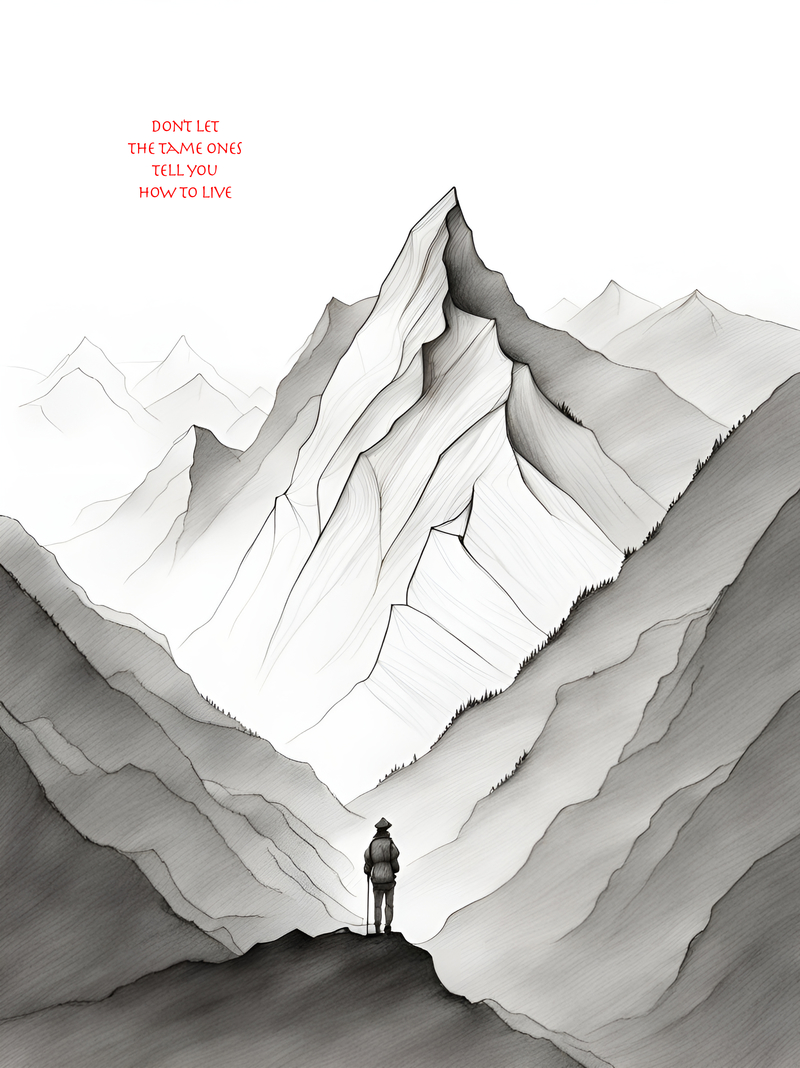“People who live far below their means enjoy a freedom that people busy upgrading their lifestyles can’t fathom.”
Naval Ravikant
Beyond the Quote (184/365)
Most people think that freedom is the absence of responsibility. But, when you look closely, the opposite is actually the case: freedom is a byproduct of responsibility. You can’t be free until you’ve taken proper responsibility for yourself and your life. You can’t even free up the mental resources needed to enjoy said freedom until you’ve covered the bases for your survival, right? How free are you really if you’re starving? How free can you possibly be if you’re without water? Is being free of a house freedom? Or is it a constant threat to your survival and a chronic cage of worry that haunts you? Let’s start by looking at the relationship between freedom and responsibility more closely.
If we were free of needing the basics for survival met on a daily basis, then we could essentially live in complete freedom. It’s why we need to be responsible in the first place! If we’re not responsible, we might die. And with that reality comes the motivation to do all else that we do in life. Why do we listen to our parents? Because they feed us, cloth us, give us shelter, and teach us how not to die. Why do we go to school? So we can learn the essentials of our world and again, learn how not to die. Why do we work jobs and pursue careers? So that we can do all of those required things needed for survival by ourselves and be independent of others—and not die. So, where does this envisioned freedom that is without responsibility come into play?
Part of the problem, I believe, has to do with the images that are constantly being flashed in front of our eyes of people who are seemingly free and living lavish, exotic, and experience-filled lives. We see people traveling the world or roaming around on their massive properties or posing with exotic animals and wonder how they got that type of freedom? And while, the answer is obviously different for each individual person, the universal consistency is that their freedom is a byproduct of the responsibilities they’ve taken, have committed to take, or have inherited. The problem is that the responsibilities, hustle, and behind the scenes work is rarely shared.
So, how did they get there? How did they achieve this type of freedom that allows them to do more of what they want to do and less of what they don’t want to do? The type of freedom that allows them to travel more, spend more time with friends and family, and live with less anxiety and work? It is only possible when we have taken enough responsibility and have created the right systems that allow for that type of living. And there are two ways to achieve this.
First, is by compiling a big enough surplus of money and resources that exceed not only your expenses, but your desires to upgrade your lifestyle in the process so that you can stop working (or work less) and still be able to not die. This is the retirement strategy. The second, is to live well below your means and focus on spending less, saving more, and living minimally. This way you can cover the basics for survival while simultaneously saving as much as possible in the process. This is the financial freedom strategy.
One of the problems with the retirement strategy is that you don’t know when you’re going to die. So how to know when you’ve saved up enough to live out the rest of your days? It’s hard to tell—ask anyone who has had to decide when the time was right for retirement. The second strategy, financial freedom, is about creating the biggest gap possible between money coming in and what’s going out. And if you can figure that out, then you are free to live within the means of that gap. If you can make that gap recurring and sustainable, then you will have the freedom to continue to live within those means for as long as that gap provides. And that gap can only ever be created with a responsible mind and deliberate effort. So, rather than trying to live at or above your means with the resources you currently have—think about living below and about creating that, “freedom gap” instead.
You know the expression, “Mo’ money mo’ problems?” Well, mo’ money only leads to mo’ problems if you’re irresponsible with that money. When you buy mo’ stuff—it leads to mo’ debt problems. When you invest in mo’ business opportunities to increase your income—it leads to mo’ management problems. When people know you have mo’ money because you flaunt it—it leads to mo’ relationship problems. But if your lifestyle remains the same as your income increases, where do the mo’ problems come from?
No change in lifestyle or behavior? No change in spending habits? How can there be a change in consequences or drama or relationships? This is part of what people mean when they warn, “don’t let the money change you.” Because with every upgrade comes upgraded problems. But what comes when you create a bigger “freedom gap” without changing anything about your lifestyle? You guessed it—Mo’ freedom.
This isn’t to say that all upgrades in life are bad! Yes, upgrades might very well lead to more comfort, and maybe that’s what you want? But don’t get comfort twisted with freedom. You can make a prison cell feel as comfortable as a cloud with the right purchases—it’s still a prison cell. Freedom and comfort both have a price. If you want to live comfortably, then upgrade your lifestyle and be content with where you are. If you want freedom, then downgrade your lifestyle and create a “freedom gap” instead. Neither one is better than the other—it’s personal choice. Just make sure you know which choice it is that you’re making.

Read Next: 25 Tony Robbins Quotes on Money and Achieving Financial Freedom
NEW In The Shop: Don’t Let The Tame Ones Tell You How To Live [Poster]
Why We ♥ It: Some of the best advice I (Matt here) ever got was: don’t take life advice from people who aren’t living a life you want to live and don’t take criticism from people you wouldn’t go to for advice. I created this poster to act as a reminder to listen more closely to our role models and less closely to our critics, trolls, and tamed-comfort-zone-hugger acquaintances. It’s also a perfect gift for the outdoor adventurer, travel enthusiast, or solo explorer (or soon to be). Available in print or digital download. 👇🏼
...Want to advertise your book, product, or service? Send inquiries to matt@movemequotes.com.

Written by Matt Hogan
Founder of MoveMe Quotes. On a mission to help busy people do inner work—for better mental health; for healing; for personal growth. Find me on Twitter / IG / Medium. I also share daily insights here. 🌱
It has taken me 1,000’s of hours to build this free library for you. If it has helped you, you can support my continued effort here. ☕️
